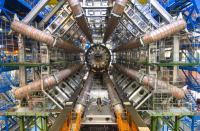Edinburgh joins the ATLAS collaboration

Physicists from Edinburgh are to join the quest for the Higgs boson particle at CERN in Switzerland.
The researchers will join the international ATLAS collaboration seeking to verify the existence of the theoretical sub-atomic particle, a crucial part of the Standard Model of Particle Physics and Cosmology.
The ATLAS experiment aims to address the most important unsolved questions in the universe, i.e., whether or not, the Higgs boson exists, and what the fundamental particle mass generation mechanism is. It could also discover the origin of dark matter and new physics models of nature (e.g. super-symmetry).
Higgs theory
Emeritus Professor Peter Higgs predicted the existence of the Higgs particle while working at the University in the 1960s. If experiments at CERN’s massive atom-smasher prove the Professor’s theory correct, he is tipped to win the Nobel Prize for physics.
Joining the research at CERN are Dr Philip Clark, Dr Victoria Martin, Dr Andy Buckley, Dr Wahid Bhimji and Dr Andy Washbrook together with students Ben Wynne, Ben Smart and Brendan O’Brien and technician Andrew Main.
They will work on the ATLAS detector, one of four experiments analysising collisions at the Large Hadron Collider as it aims to recreate the conditions of the Big Bang.
Impact of research
Their work will involve modelling and simulating the particle collision process in order to understand the detector response and the complex data produced by the experiments. They will also contribute to the operation of the detector itself and provide software to manage the data produced.
Global partnership
Physicists from Edinburgh are already involved in another project at CERN (LHCb) but, until now, have not taken part directly in the search for the Higgs Boson.
The Edinburgh team joins the collaboration, involving 2900 people in 37 countries, after a year of preparatory work with support from colleagues in the Scottish Universities Physics Alliance.
Quote
This project represents the pinnacle of the UK’s ongoing research in particle physics, and is likely to dominate the field for the next 15 years. Our work could contribute to a paradigm shift in our current understanding of the physical universe.
Dr Philip Clark,
School of Physics and Astronomy

